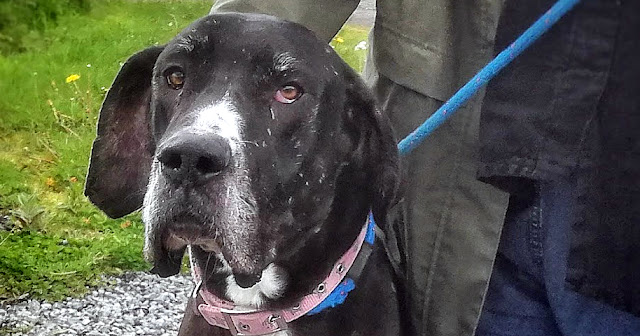We're about to adopt another dog - a beautiful, two year old Great Dane called Willow. She's been abused, badly treated, underfed and is covered in scars. We will never know the full story of her life up to this point but we can't wait to give her a safe and loving new home. We will welcome her, spoil her a bit, support her and train her; she will go where we go and, without a shadow of a doubt, she will sleep on our bed at night. She will be treated like one of the family - because that's exactly what she will be.
As "one of the family", pets embed themselves not just into your life but into your heart, so when they become unwell, it can be deeply emotional. Then the day you dread finally dawns - either they die or, sometimes even worse, you have to make the decision to euthanise.
This can be utterly devastating but we somehow feel as if we're not allowed to grieve publicly because it's "just" a dog or a cat. For me, there's no "just" about it - I have felt the loss of many dogs very deeply and it never gets any easier to bid them farewell.
The "human" grieving process is well documented; it comes in five stages - denial, anger, bargaining, depression & acceptance. As with human loss, this process over the loss of a beloved animal friend can not only take time but also be difficult to understand and navigate. It's not a case of "getting over it" either. If the process seems elongated or slow to pass, maybe it's worth thinking about some therapy.
Why try therapy?
This can be utterly devastating but we somehow feel as if we're not allowed to grieve publicly because it's "just" a dog or a cat. For me, there's no "just" about it - I have felt the loss of many dogs very deeply and it never gets any easier to bid them farewell.
The "human" grieving process is well documented; it comes in five stages - denial, anger, bargaining, depression & acceptance. As with human loss, this process over the loss of a beloved animal friend can not only take time but also be difficult to understand and navigate. It's not a case of "getting over it" either. If the process seems elongated or slow to pass, maybe it's worth thinking about some therapy.
Why try therapy?
I'm there to help you, to support you, and to provide a safe environment in which to express your thoughts and feelings. Of course, you might well feel distressed, but as a trained professional, I'm there to support you through these stages of loss. One of the many reasons that talking to a therapist works, is that I am used to the pain and grief of others and can not only safely sit with you grief, but hold and guide you through it. With the best intentions, our loved ones find our pain difficult to bear and they just want us to be ok. Without meaning to, they may be shutting us down, stopping us from moving on, with phrases like “I hate to see you so upset”, “I miss her too, you know”, or “but he died months ago!”. The therapeutic process will hear you, with acceptance and understanding - and without judgement.
I will never force you talk about something you can’t talk about, until you feel you can. I won't judge you. I won’t tell you to stop crying. I won’t tell you it’s just a cat. I will hear, accept and understand you, when you say the pet was like a family member or a best friend. I will understand that you are finding it difficult to cope because I've been through it and share the sentiment fully.
I will never force you talk about something you can’t talk about, until you feel you can. I won't judge you. I won’t tell you to stop crying. I won’t tell you it’s just a cat. I will hear, accept and understand you, when you say the pet was like a family member or a best friend. I will understand that you are finding it difficult to cope because I've been through it and share the sentiment fully.
Bereavement is a process, but one that we all do differently. There is no correct way to mourn loss. I am able to support you towards healing, but I won’t ask you to forget or "get over it".
I fully believe in what I do and I really am here to help.
For answers to more of your questions, visit www.damiangeorge.co.uk
I fully believe in what I do and I really am here to help.
For answers to more of your questions, visit www.damiangeorge.co.uk

Comments
Post a Comment